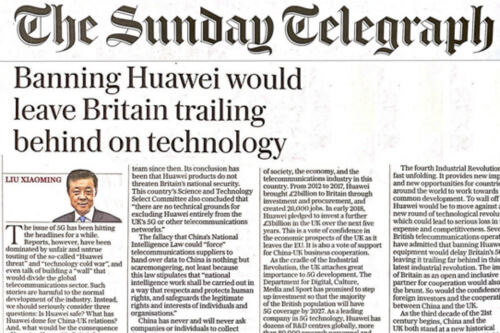
2020年1月5日,英国主流大报《星期日电讯报》以《禁止华为将使英国在新一轮技术革命中落后》为题,在纸质版和网络版发表驻英国大使刘晓明署名文章。全文如下:文章源自英文巴士-https://www.en84.com/8625.html
文章源自英文巴士-https://www.en84.com/8625.html
On 5 January 2019, The Sunday Telegraph carried an article by Ambassador Liu Xiaoming entitled “Banning Huawei would leave Britain trailing behind on technology”. The full text is as follows:文章源自英文巴士-https://www.en84.com/8625.html
文章源自英文巴士-https://www.en84.com/8625.html
禁止华为将使英国在新一轮技术革命中落后文章源自英文巴士-https://www.en84.com/8625.html
Banning Huawei Would Leave Britain Trailing Behind on Technology文章源自英文巴士-https://www.en84.com/8625.html
文章源自英文巴士-https://www.en84.com/8625.html
一个时期以来,5G问题一直广受关注。个别国家极力兜售所谓“华为威胁论”,散布“科技冷战”阴云,试图给全球电信行业筑起“隔离墙”。这些言行违背开放包容的时代潮流,影响各国电信业的正常发展,是十分危险的。那么,华为究竟是否安全可靠?华为给中英关系带来什么?“禁止华为”将有什么后果?我想就这些问题谈几点看法:文章源自英文巴士-https://www.en84.com/8625.html
文章源自英文巴士-https://www.en84.com/8625.html
The issue of 5G has been hitting the headlines for a while. Reports, however, have been dominated by unfair and untrue touting of the so-called “Huawei threat” and “technology cold war”, and even talk of building a “wall” that would divide the global telecommunications sector. Such stories are harmful to the normal development of the industry. Instead, we should seriously consider three questions: Is Huawei safe? What has Huawei done for China-UK relations? And, what would be the consequence of banning Huawei in Britain?文章源自英文巴士-https://www.en84.com/8625.html
首先,关于华为的安全性,公道自在人心。目前,华为为全球170多个国家和地区、30多亿人提供网络服务。没有任何一个国家、任何一个组织、任何一个公司或者任何一个人能拿出确凿证据,证明华为产品构成安全威胁。为应对各方质疑,华为公开承诺,愿签署无“后门”协议,并接受第三方检测和监督。在英国,华为自2010年以来主动斥资建立“网络安全评估中心”并持续运营至今,由英方专业人员对华为产品进行评估。英方的结论是,华为产品风险可控。英国议会科技委员会也认为,从技术安全角度看,没理由将华为排除在英国5G建设之外。一些别有用心的人炒作,中国根据《国家情报法》可以“迫使”电信供应商移交数据。事实上,上述法律规定,国家情报工作应当依法进行,尊重和保障人权,维护个人和组织合法权益。中国从来没有也不会要求企业或个人以违反当地法律的方式、以安装“后门”等形式为中国政府采集或提供位于外国境内的数据、信息和情报。反倒是那个叫得最响的国家,不少大公司被媒体披露存在安全漏洞,爆出多起“后门”事件,这无异于“贼喊捉贼”。中国有句话“欲加之罪,何患无辞”,滥用国家安全理由、人为制造“华为5G安全风险”,只能影响各国开展正常合作,最终只会搬起石头砸自己的脚。
The answer to the first question can be found in the facts. Huawei provides network services to more than three billion people in over 170 countries and regions, of which no country, organisation, company or individual has come up with concrete evidence that its products pose any security threat. Moreover, Huawei has publicly pledged that it is ready to sign a “no-back door” agreement and accept tests and supervision by a third party.
Here in the UK, Huawei established a cyber security evaluation centre in 2010 at its own expense. This has been operated and managed by an all-British team since then. Its conclusion has been that Huawei products do not threaten Britain’s national security. This country’s Science and Technology Select Committee also concluded that “there are no technical grounds for excluding Huawei entirely from the UK’s 5G or other telecommunications networks.”
The fallacy that China’s National Intelligence Law could “force” telecommunications suppliers to hand over data to China is nothing but scaremongering, not least because this law stipulates that “national intelligence work shall be carried out in a way that respects and protects human rights, and safeguards the legitimate rights and interests of individuals and organisations.”
China has never and will never ask companies or individuals to collect data, information or intelligence in other countries by illegal means. Fabricating “Huawei risk” in the name of national security is tantamount to giving a dog a bad name to hang him. Doing so will only hamper normal cooperation between countries, and in the end, those who intend to scare others would lift the stone only to drop it on their own feet.
第二,关于华为对中英合作的贡献,事实胜于雄辩。华为落户英国近20年,对英国经济社会和电信业发展做出巨大贡献,可以说是中英合作共赢的典范。从2012年至2017年,华为在英采购和投资20亿英镑,支撑当地就业2.6万个。2018年初,华为承诺其后5年在英追加投入30亿英镑,这是在脱欧背景下对英国未来发展投下的“信任票”,更是为推进中英务实合作投下的“支持票”。作为工业革命起源地,英国高度重视5G建设,英国数文媒体部强调要加大投资,力争2027年前在大部分地区普及5G网络。华为是5G全球领军者,在全球设立数十个研发中心,拥有8万多研发人员,5G专利数量全球第一。双方加强合作不仅互惠互利,也能互相促进、共同成长,为两国乃至全球信息产业发展做出更大贡献。
This leads one to the second question. Huawei has not done any of the things it is accused of doing. What it has done over the past 20 years since coming to the UK is to have contributed hugely to the development of society, the economy, and the telecommunications industry in this country. From 2012 to 2017, Huawei brought £2 billion to Britain through investment and procurement, and created 26,000 jobs. In early 2018, Huawei pledged to invest a further £3 billion in the UK over the next five years. This is a vote of confidence in the economic prospects of the UK as it leaves the EU. It is also a vote of support for China-UK business cooperation.
As the cradle of the Industrial Revolution, the UK attaches great importance to 5G development. The Department for Digital, Culture, Media and Sport has promised to step up investment so that the majority of the British population will have 5G coverage by 2027. As a leading company in 5G technology, Huawei has dozens of R&D centres globally, more than 80,000 research personnel and more 5G patents than anyone else in the world. Closer cooperation between Huawei and the UK benefits both sides.
第三,关于“禁止华为”的后果,无疑是开历史倒车。环顾世界,保护主义、单边主义严重冲击国际经济秩序,但经济全球化是不可逆转的时代潮流。在这样的形势下,我们更要坚持多边主义,而不是单边独霸;要坚持合作共赢,而不是“本国优先”;要坚持“拆墙”,而不是“筑墙”。当前,以5G+物联网等新兴技术为代表的第四次工业革命方兴未艾,新一轮科技革命理应成为各国共同发展的新动力、新机遇。放弃与华为开展5G合作,无疑意味着逆潮流而动,带来时间、成本和市场竞争力的巨大损失。英国多家电信运营商明确表示,禁用华为设备,将使英5G网络建设延迟2至3年,更使英国在第四次工业革命浪潮中落在后面。英国素以开放包容著称,禁止华为不仅将影响华为在英经营,而且损害英国自身国际形象,打击外国投资者对英国未来的信心,对中英合作也将带来消极影响。
This brings us to the third question, and the answer to that is that banning Huawei means back-pedalling for Britain. Quite aside from the protectionist blow that such a move would strike, economic globalisation remains an irreversible trend of our times. Under such circumstances, it is all the more important to choose multilateralism over unilateralism and hegemony, cooperation over putting one’s own country first, and to work to tear down walls instead of erecting one.
The fourth Industrial Revolution is fast unfolding. It provides new impetus and new opportunities for countries around the world to work towards common development. To wall off Huawei would be to move against a new round of technological revolution, which could lead to serious loss in time, expense and competitiveness. Several British telecommunications operators have admitted that banning Huawei equipment would delay Britain’s 5G, leaving it trailing far behind in this latest industrial revolution. The image of Britain as an open and inclusive partner for cooperation would also bear the brunt. So would the confidence of foreign investors and the cooperation between China and the UK.
世界已进入21世纪第三个十年,中国和英国都站在新的历史起点上,两国关系也面临新的机遇。我衷心希望,英国政府能够坚持开放包容理念,坚持公平、公正、非歧视原则,在华为问题上做出经得起历史检验的决策,为深化中英互利合作创造条件,为造福两国人民做出贡献。
As the third decade of the 21st century begins, China and the UK both stand at a new historical starting point. I hope that the British government’s decision on Huawei will stand the test of time, that it will demonstrate an adherence to open and inclusive cooperation and uphold the principles of fairness, justice and non-discrimination.
Making the right choice will help foster sound conditions for deeper and mutually beneficial cooperation between China and the UK and deliver more benefit to the peoples of our two countries.

